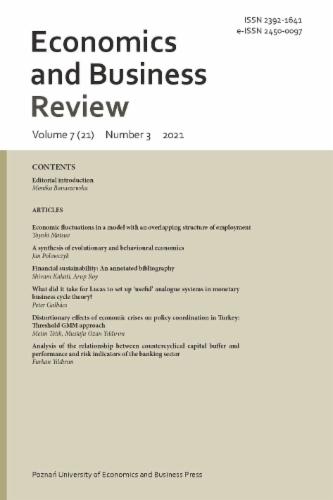Examining the effect of credit on monetary policy with Markov regime switching: Evidence from Turkey
Examining the effect of credit on monetary policy with Markov regime switching: Evidence from Turkey
Author(s): Ali IlhanSubject(s): Economic policy, Public Finances, Fiscal Politics / Budgeting
Published by: Wydawnictwo Uniwersytetu Ekonomicznego w Poznaniu
Keywords: credit; financial stability; monetary policy; macroprudential policy; Markov regime switching; Turkey;
Summary/Abstract: This paper analyses the effect of credit on monetary policy responses for different regimes in Turkey. To do so, the Taylor rule augmented with the credit gap is estimated by using a Markov regime switching model from January 2006 to December 2019. The empirical findings identify two regimes: the low- and high-interest rate regimes. The prevalence of the former indicates policy authorities’ growth priorities. Furthermore, differing responses across the regimes reflect that the Central Bank of the Republic of Turkey has an asymmetric policy stance. In the low-interest rate regime, the monetary policy only significantly responds to inflation. In the high-interest rate regime, both inflation and credit have significant positive impacts on interest rate setting. This indicates that credit conditions affected the tightening of the monetary policy stance in Turkey despite the use of macroprudential tools after the global financial crisis.
Journal: Economics and Business Review
- Issue Year: 8/2022
- Issue No: 4
- Page Range: 68-87
- Page Count: 20
- Language: English

